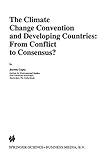The climate change convention and developing countries : from conflict to consensus? [Libro electrónico] / Joyeeta Gupta
Por: Gupta, Joyeeta [autor/a].
Tipo de material: Libro
en línea Editor: Dordrecht: Springer science, c1997Descripción: xii, 249 páginas : gráf. ; centímetros.ISBN: 9048148588; 9789048148585; 9789401589253 (Online).Nota de acceso: Disponible para usuarios de ECOSUR con su clave de acceso Nota de bibliografía: Incluye bibliografía: páginas 06-222 e índice: páginas 46-249 Número de sistema: 57341Resumen:
Libro
en línea Editor: Dordrecht: Springer science, c1997Descripción: xii, 249 páginas : gráf. ; centímetros.ISBN: 9048148588; 9789048148585; 9789401589253 (Online).Nota de acceso: Disponible para usuarios de ECOSUR con su clave de acceso Nota de bibliografía: Incluye bibliografía: páginas 06-222 e índice: páginas 46-249 Número de sistema: 57341Resumen:| Tipo de ítem | Biblioteca actual | Colección | Signatura | Estado | Fecha de vencimiento | Código de barras |
|---|---|---|---|---|---|---|
| Libros | Biblioteca Electrónica Recursos en línea (RE) | Acervo General | Recurso digital | ECO400573416349 |
Incluye bibliografía: páginas 06-222 e índice: páginas 46-249
Disponible para usuarios de ECOSUR con su clave de acceso
The climate change problem can only be effectively dealt with if global anthropogenic greenhouse gas (GHG) emissions can be reduced substantially. Since the emission of such gases is closely related to the economic growth of countries, a critical problem to be addressed by the United Nations Framework Convention on Climate Change (FCCC) is: how will the permissible emission levels be shared between industrialised (ICs) and developing countries (DCs)? The thesis of this book is that the long-term effectiveness of the FCCC runs the risk of a horizontal negotiation deadlock between countries and the risk of vertical standstill within countries if there is little domestic support for the domestic implementation of measures being announced in international negotiations. The research question is: Can one observe trends towards horizontal deadlock and vertical standstill and if yes, how can the treaty design be improved so as to avoid such potential future bottlenecks? The research focuses on the perspectives of domestic actors on the climate convention and related issues in four developing countries: India, Indonesia, Kenya and Brazil. The following key findings emerge from the research: 1. Handicapped negotiating power: The common theme of the foreign policy of DCs is that ICs are responsible for the bulk of the GHG emissions and need to take appropriate domestic action. eng
Disponible en línea
Disponible en formato PDF
Subscripción a ELSEVIER 26 de diciembre del 2013
